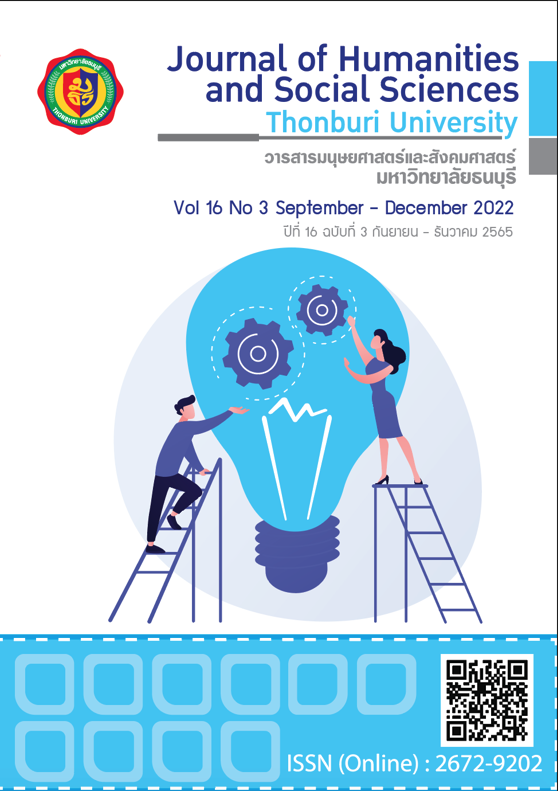Development of Knowledge Management Model to Improve the Performance of Employees in Small Hotels, Greater Mekong Sub Region Tourism Development Area
Keywords:
Knowledge Management, Promoting Employee Performance, Crisis the COVID-19 Pandemic, Small Hotels, Greater Mekong Sub Region Tourism Development AreaAbstract
This research primarily aimed to: 1. Study the guidelines for promoting the performance; 2. Develop knowledge management to promote the performance; and 3. Propose guidelines for developing a model of knowledge management to promote the performance of employees in small hotels. This study was conducted using mixed methods approach including: 1. Quantitative research is conducted by using questionnaires for the tourists and employees. The analyzing the data by mean, standard deviation. 2. Qualitative data were collected by in-depth interviews and focus group for executives/staff of hotels, travel agent, guide, the provincial tourism office in the area, research academics, and using content analysis. It was found that 1. Knowledge acquisition in operation has been adjusted to the future of work after COVID-19 pandemic. 2. Knowledge creation by using more technology. 3. Knowledge transfer and utilization to be connected with business groups that can link services/operation as well as further business development to meet the needs of different and diverse tourists. 4. Knowledge storage and retrieval for training the knowledge skills upskill/ reskill/ newskill to support after crisis the COVID-19 pandemic.
References
กระทรวงการท่องเที่ยวและกีฬา. (2554). มาตรฐานสมรรถนะร่วมวิชาชีพสำหรับการท่องเที่ยวอาเซียนสาขาธุรกิจโรงแรม. กรุงเทพมหานคร. สำนักงานปลัดกระทรวงการท่องเที่ยวและกีฬา.
กระทรวงการท่องเที่ยวและกีฬา. (2561). แนวทางการพัฒนาและส่งเสริมการท่องเที่ยวกลุ่มจังหวัดภาคตะวันออกเฉียงเหนือ ตอนบน 1 และภาคเหนือตอนล่าง 1. สืบค้นเมื่อ 20 มกราคม 2565, จาก https://cabinet.soc.go.th/doc_ image/2561/993298605.pdf
กระทรวงการท่องเที่ยวและกีฬา. (2563). สถานการณ์การท่องเที่ยวในประเทศ รายจังหวัด ปี 2563 (Domestic Tourism Statistics ( Classify by region and province 2020). สืบค้นเมื่อ 20 มกราคม 2565, จาก https://mots.go.th/more_news_new.php?cid=594
ยุทธ ไกยวรรณ์. (2558). หลักสถิติวิจัยและการใช้โปรแกรม SPSS. กรุงเทพฯ: สำนักพิมพ์แห่งจุฬาลงกรณ์มหาวิทยาลัย.
ราชกิจจานุเบกษา. (2560). ประกาศคณะกรรมการพัฒนาการท่องเที่ยวประจําเขตพัฒนาการท่องเที่ยววิถีชีวิตลุ่มแม่น้ำโขง เรื่อง แผนปฏิบัติการพัฒนาการท่องเที่ยว ภายในเขตพัฒนาการท่องเที่ยววิถีชีวิตลุ่มแม่น้ำโขง พ.ศ. 2560-2564. สืบค้นเมื่อ 20 มกราคม 2565, จาก http://www.oic.go.th/FILEWEB/CABINFOCENTER17/DRAWER021/GENERAL/DATA0000/00000137.PDF
ลักขณา อุดม และ อังค์วรา เหลืองนภา. (2562). คุณสมบัติของพนักงานต้อนรับส่วนหน้าในโรงแรม. การประชุมวิชาการนำเสนอผลงานวิจัยระดับชาติของนักศึกษาด้านมนุษย์ศาสตร์และสังคมศาสตร์ ครั้งที่ 2 ณ คณะมนุษยศาสตร์และสังคมศาสตร์ มหาวิทยาลัยราชภัฏสวนสุนันทา. 333-343. สืบค้นเมื่อ 20 มกราคม 2565, จาก http://hs.ssru.ac.th/useruploads/files/20190304/9ecf8b313824f8abfb83701538865c4d4fa3b462.pdf
วัฒนา ทนงค์แผง และชวลีย์ ณ ถลาง. (2560). รูปแบบการบริหารจัดการธุรกิจโรงแรมขนาดเล็ก เขตพื้นที่จังหวัด ตราด. วารสารวิทยาลัยดุสิตธานี. 11(3): 1-17.
ศันสนีย์ กระจ่างโฉม กรวรรณ สังขกร และ นิเวศน์ พูนสุขเจริญ. (2564). กลยุทธ์การปรับตัวของภาคการท่องเที่ยวในภาคเหนือตอนบนภายใต้วิกฤติการณ์การระบาดโควิด-19. วารสารวิชาการมหาวิทยาลัยหอการค้าไทย มนุษยศาสตร์และสังคมศาสตร์. 41(1). 1-20.
เอกชัย ชํานินา. (2563). ความสามารถของภาครัฐกับการจัดการการท่องเที่ยวภายใต้สถานการณ์โรคติดต่อเชื้อไวรัสโคโรนา 2019 (COVID-19). วารสารสังคมศาสตร์และมานุษยวิทยาเชิงพุทธ. 5(11): 420-433.
Battor, M., & Battor, M. (2010). The impact of customer relationship management capability on innovation and performance advantages: Testing a mediated model. Journal of Marketing Management. 26(9-10): 842-857.
David S., Mahesh S., Robert C. F., Maria G., Hee J. K., Murat H. (2019). Leveraging human touch in service interactions: lessons from hospitality. Journal of Service Management. Retrieved January 20, 2022, from https://www.researchgate.net/publication/333578664_Leveraging_human_touch_in_service_interactions_lessons_from_hospitality_Leveraging_human_touch_in_service_interactions
IpKin Anthony Wong. (2013). Exploring customer equity and the role of service experience in the casino service encounter. International Journal of Hospitality. Retrieved January 20, 2022, from https://www.researchgate.net/publication/270978301_Exploring_customer_equity_and_the_role_of_service_experience_in_the_casino_service_encounter
Kasim, A., & Minai, B. (2009). Linking CRM Strategy, Customer Performance Measures and Performance in the Hotel Industry. Journal of Economics and Management. 3(2): 297 – 316.
Nolan, C. (2002). Human Resource Development in the Irish Hotel Industry: The Case of the Small Firm. School of Hospitality Management and Tourism, Dublin Institute of Technology, Dublin: Ireland.
Peltier, J., Pointer, L., & Schibrowsky, J.A. (2007). Internal marketing and the antecedents of nurse satisfaction and loyalty. Health Marketing Quarterly. 23(4): 75-108.
Taro Yamane. (1973). Statistics: an introductory analysis. New York: New York: Harper & Row.
Translated Thai References
Chamnina, E., (2020). Public Sector Capabilities and Tourism Management under the Coronavirus Infectious Disease (Covid-19) Situation. Journal of Social Science and Buddhistic Anthropology. 5(11): 420-433. (in Thai)
Kaiyawan, Yuth. (2015). Principles of research statistics and use of SPSS program. Bangkok: Chulalongkorn University Press.
Krajangchom, S., Sangkakorn, K., & Poonsukcharoen, N., (2020). The Adaptation Strategy of Tourism in Upper North of Thailand under the COVID-19 Pandemic. University of Chamber of Commerce Journal Humanities and Social Sciences. 41(1): 1-20. (in Thai)
Ministry of Tourism and Sports. (2011). Professional Competency Standard for ASEAN Tourism in Hotel Business. Bangkok: Office of the Permanent Secretary, Ministry of Tourism and Sports. (in Thai)
Ministry of Tourism and Sports. (2018). Guidelines for the development and promotion of tourism in regional provinces Upper Northeast 1 and Lower North 1. Retrieved January 20, 2022, from https://cabinet.soc.go.th/doc_image/2561/993298605.pdf (in Thai)
Ministry of Tourism and Sports. (2020). Domestic Tourism Statistics (Classify by region and province 2020). Retrieved January 20, 2022, from https://mots.go.th/more_news_new.php?cid=594 (in Thai)
Tanongphaeng, W., & Na Thalang, C., (2017). Management Model for Small Hotel in Trad Province. Dusit Thani College Journal. 11(3): 1-17. (in Thai)
Thai government gazette. (2017). Announcement of the Tourism Development Committee in the Mekong River Valley Tourism Development Area on Tourism Development Action Plan Within the Mekong lifestyle tourism development zone, 2017-2021. Retrieved January 20, 2022, from http://www.oic.go.th/FILEWEB/CABINFOCENTER17/DRAWER021/GENERAL/DATA0000/00000137.PDF (in Thai)
Udom, L., & Luengnapha, A., (2019). Qualifications of front desk staff in hotels. The 2nd National Conference on Humanities and Social Sciences Students' Research Presentations at the Faculty of Humanities and Social Sciences Suan Sunandha Rajabhat University. 333-343. Retrieved January 20, 2022, from http://hs.ssru.ac.th/useruploads/files/20190304/9ecf8b313824f8abfb83701538865c4d4 fa3b 462.pdf (in Thai)
Downloads
Published
How to Cite
Issue
Section
License
Copyright (c) 2022 Penpaksina Wic

This work is licensed under a Creative Commons Attribution-NonCommercial-NoDerivatives 4.0 International License.
ผลงานที่ปรากฎในวารสารฉบับนี้เป็นลิขสิทธิ์เฉพาะส่วนบุคคลของผู้เขียนซึ่งต้องรับผิดชอบต่อผลทาง กฎหมายที่อาจเกิดขึ้นได้และไม่มีผลต่อกองบรรณาธิการ






